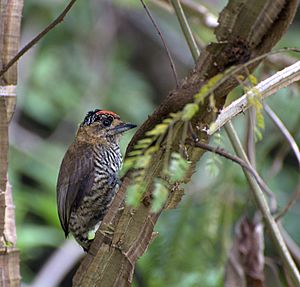Piculet facts for kids
Quick facts for kids Piculets |
|
|---|---|
 |
|
| Ochre-collared piculet | |
| Scientific classification | |
| Kingdom: | |
| Phylum: | |
| Class: | |
| Order: | |
| Family: | |
| Subfamily: |
Picumninae
|
| Genera | |
|
Picumnus |
|
The piculets are tiny birds that belong to the same family as woodpeckers. They are mostly found in the warm, tropical areas of South America. You can also find a few types in Asia and just one kind in Africa.
Contents
What Makes Piculets Special?
Like their larger woodpecker cousins, piculets have big heads. They also have long tongues. These tongues help them catch insects, which are their main food.
Their Unique Feet
Piculets have special feet called zygodactyl feet. This means two of their toes point forward and two point backward. This helps them grip branches and tree trunks.
How They Climb and Perch
Unlike true woodpeckers, piculets do not have stiff tail feathers. Woodpeckers use these feathers to prop themselves up when climbing trees. Piculets are more likely to sit on a branch rather than climb straight up a tree trunk.
What Do Piculets Eat?
Piculets mainly eat insects and their larvae, called grubs. They find these tasty treats mostly in wood that is starting to decay. This means old, soft wood that is breaking down.
Where Do Piculets Live?
When it's time to build a nest, piculets are quite clever. They don't make their own holes in trees. Instead, they reuse holes that woodpeckers have already made.
Their Eggs
Like many birds that nest inside holes, piculets lay white eggs. This is a common feature for birds that lay their eggs in dark places.
The Piculet Family Tree
There are about 30 different kinds of piculets in the world. Scientists believe that piculets separated from the main woodpecker family a long time ago. This happened about 15 million years ago.
How They Evolved
The different groups, or genera, of piculets started to become separate about 7.9 million years ago. This shows how they slowly changed over millions of years.
What Do Piculets Look Like?
Most piculets have dull green or grey feathers on their upper bodies. Their undersides are usually white with dark streaks. These streaks look like thin lines or stripes.
 | Anna J. Cooper |
 | Mary McLeod Bethune |
 | Lillie Mae Bradford |

